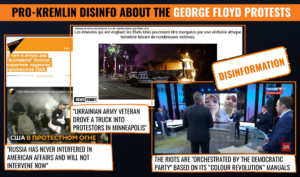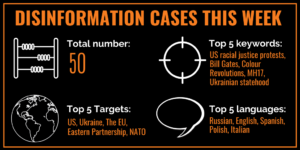Preliminary reports suggest that some foreign actors are already seeking to instrumentalise the unrest in the US for their own ends, the EU Stratcom Task Force reports. An analysis of Twitter accounts by Politico for example found that Russia and China are flooding social media with content targeting the US unrest, piggybacking onto hashtags linked to George Floyd to push divisive messages.
 The pro-Kremlin media appear to be alleging that the riots are based on “color revolution” manuals, and that a Ukrainian army veteran drove a truck into protestors in Minneapolis, similarly to the 2014 “coup” in Kyiv, it adds, citing a report by social media analytics firm Graphika notes that Russia, China, and Iran are using state-sponsored media to further their own narratives about the US.
The pro-Kremlin media appear to be alleging that the riots are based on “color revolution” manuals, and that a Ukrainian army veteran drove a truck into protestors in Minneapolis, similarly to the 2014 “coup” in Kyiv, it adds, citing a report by social media analytics firm Graphika notes that Russia, China, and Iran are using state-sponsored media to further their own narratives about the US.
While disinformation is not new to politics, today’s technologies enable political actors to manipulate the information ecosystem at scale and with great speed, the International Forum for Democratic Studies observes. Through massive networks of fake accounts, junk news sites, and the strategic use of conspiracy theories, half-truths, and falsehoods, authoritarian regimes and others are suffocating and dividing the public square. These “lie machines” are aided by expanding troves of data on individuals and an information ecosystem that facilitates polarization, outrage, and social distrust. The net result of their efforts is deadly to democracy.
 Philip Howard’s new book, Lie Machines: How to Save Democracy From Troll Armies, Deceitful Robots, Junk News Operations, and Political Operatives, offers behind-the-scenes stories from the world’s biggest and most damagingly successful misinformation initiatives.
Philip Howard’s new book, Lie Machines: How to Save Democracy From Troll Armies, Deceitful Robots, Junk News Operations, and Political Operatives, offers behind-the-scenes stories from the world’s biggest and most damagingly successful misinformation initiatives.
In the first installment of the RAND Remote COVID-19 briefing series, researchers Jennifer Kavanagh and Todd Helmus discuss why disinformation is so prevalent, how people can navigate a challenging information environment, and how China, Russia, and Iran are spreading inaccurate information. RAND’s research initiative is aimed at countering Truth Decay, the diminished role of facts and analysis in public life. Watch the video »
The Covid pandemic has increased opportunities for authoritarian leaders and partisan divides to destabilize democratic systems, said contributors to a May 22 webinar (above) hosted by Cornell University’s Einaudi Center focused on problems at the intersection of democracy and pandemic.
In “Democratic Challenges in the Time of COVID-19: Global Perspectives,” thought leaders who study democracy in Asia, Africa, Europe, Latin America and the United States addressed the pandemic’s short- and long-term threats to democracy.
A forthcoming online forum will discuss Lie Machines….., the new book by Philip Howard, director of the Oxford Internet Institute.
 FEATURING
FEATURING
Philip Howard, Oxford Internet Institute
Laura Rosenberger, Alliance for Securing Democracy
Daniel Arnaudo, National Democratic Institute for International Affairs
MODERATED BY
Shanthi Kalathil, International Forum for Democratic Studies
June 10, 2020. 11:00 am – 12:00 pm RSVP







